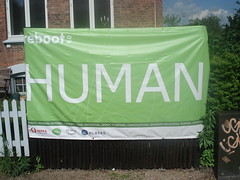
I've watched rather painfully the fall out in
comments and
blog posts mostly from ex colleagues, following Bobbie Johnson's
series of pieces in the Guardian investigating
new media and innovation at the BBC. A long blog post
criticising the technology behind the iPlayer and then a wider piece the following Monday bemoaning innovation at the BBC itself following Greg Dyke's comments to a Select Committee was uncomfortable stuff. This was followed again by
a column from Emily Bell arguing that "The failure to innovate is a company-wide problem, not the preserve of the people in trainers." Charming. I wear a natty pair of Clarks Desert Boots every day.
I'm not going to comment (too much) further except to point you to this
Backstage podcast from Februarywhere
Tom Loosemore (from the BBC),
James Cridland (
then now from Virgin radio but
now soon to be a BBC exec ) and a panel of "experts", some highly critical of the BBC's position, discuss DRM, innovation and the BBC to your hearts content. (ok. for over an hour). Its worth restating again the highly complex background against which the BBC operates. This is a theme running through the podcast but here is a typical example as any. Last week the
DCMS Select Committee released a paper summarising a series of submissions from the great and the good around "new media and the creative industries" over the last few months. Its a 100 page dense piece of work but fascinating especially around DRM and its recommendations around home copying. However its this anecdote about the Creative Archive project (now at the end of its pilot phase) that caused a smile.
There were criticisms by witnesses of the BBC for appearing to encourage a cavalier approach to copyright through its message to users of the Creative Archive—"find it, rip it, mix it, share it, come and get it". BECTU* pointed out that there was no suggestion of "Respect it" in the slogan and that users were quite likely to be unaware of the terms of the licence.The Music Managers' Forum suggested that the underlying message "had the air of an organisation which seeks to undermine copyright rather than a publicly-owned authority which should emphasise best practice".Many witnesses urged the BBC to use its position as a public service broadcaster with unparalleled access to audiences and experience in interpreting complex issues for public consumption to promote copyright education through its services.The Creators Rights Alliance agreed and suggested that the BBC should inform users that they were paying for the right to view content rather than the right to own it. 156. The BBC defended its slogan, saying that the terms used were "the common parlance of the Internet", used by Microsoft and iTunes, and were in no way the language of piracy.While this may be true, the common parlance of the Internet should not be setting the standard for the BBC. We recommend that the BBC should amend the slogan for the Creative Archive, if it proceeds beyond the pilot phase, to convey the message to users that content should be respected. The BBC should examine whether more can be done to oblige users of the Creative Archive to read the terms of the licence governing use of the material before downloading and consider what other action it can take to educate consumers about the purpose and importance of copyright law.
The common parlance of the internet "should not be setting the standard for the BBC". They make it sound dirty...
Labels: bbc guardian iplayer highfield





